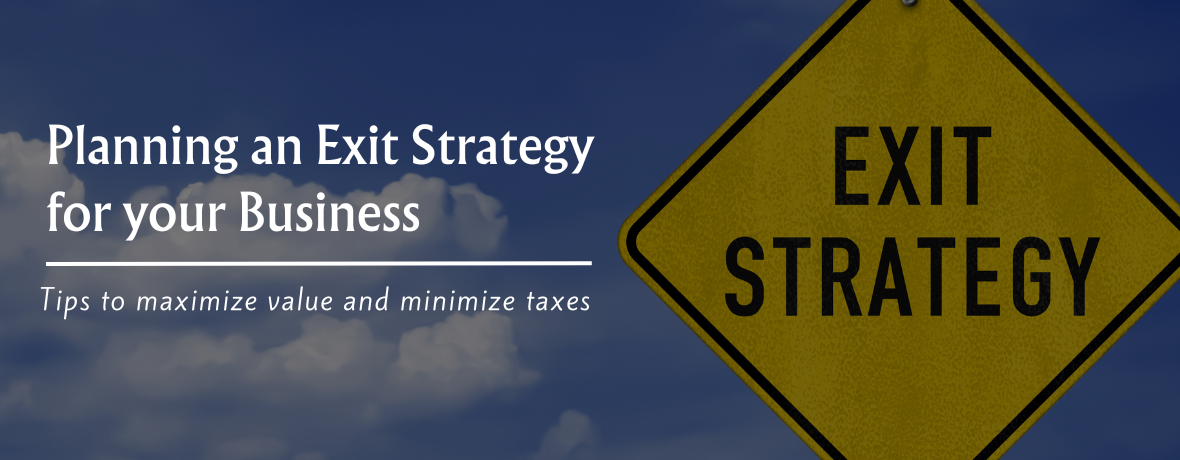
Planning an Exit Strategy for your Business
Tips to maximize value and minimize taxes
Every business owner should have an exit strategy that helps recoup the maximum amount for his or her investment. Understanding the tax implications of a business sale will help you plan for — and, in some cases, reduce — the tax impact. One option is to sell your business to a third party. Here are some considerations to help ensure the transition is as smooth as possible.
Maximizing value
Start by obtaining a professional valuation of your business to give you an idea of what the business is currently worth. The valuation process also will help you understand what factors drive the value of your business and identify any weaknesses that reduce its value.
Once you’ve received a valuation, you can make changes to enhance the business’s value and potentially increase the selling price. For example, if the valuator finds that the business relies too heavily on your management skills, bringing in new management talent may make the business more valuable to a prospective buyer.
A valuation can also reveal concentration risks. For instance, if a significant portion of your business is concentrated in a handful of customers or one geographical area, you could take steps to diversify your customer base.
Structuring the sale
Corporate sellers generally prefer selling stock rather than assets. That’s because the profit on a stock sale is generally taxable at more favorable long-term capital gains rates, while asset sales generate a combination of capital gains and ordinary income. For a business with large amounts of depreciated machinery and equipment, asset sales can generate significant ordinary income in the form of depreciation recapture. (Note: The tax rate on recaptured depreciation of certain real estate is capped at 25%.)
In addition, if your company is a C corporation, an asset sale can trigger double taxation: once at the corporate level and a second time when the proceeds are distributed to shareholders as a dividend. In a stock sale, the buyer acquires the stock directly from the shareholders, so there’s no corporate-level tax.
Buyers, on the other hand, almost always prefer to buy assets, especially for equipment-intensive businesses, such as manufacturers. Acquiring assets provides the buyer with a fresh tax basis in the assets for depreciation purposes and allows the buyer to avoid assuming the seller’s liabilities.
Allocating the purchase price
Given the significant advantages of buying assets, most buyers are reluctant to purchase stock. But even in an asset sale, there are strategies for a seller to employ to minimize the tax hit. One strategy is to negotiate a favorable allocation of the purchase price. Although tax rules require the purchase price allocation to be reasonable in light of the assets’ market values, the IRS will generally respect an allocation agreed on by unrelated parties.
As a seller, you’ll want to allocate as much of the price as possible to assets that generate capital gains, such as goodwill and certain other intangible assets. The buyer will prefer allocations to assets eligible for accelerated depreciation, such as machinery and equipment. However, depreciable assets are likely to generate ordinary income for the seller.
Allocating a portion of the purchase price to goodwill can be a good compromise between the parties’ conflicting interests. Sellers enjoy capital gains treatment while buyers can generally amortize goodwill over 15 years for tax purposes.
If your company is a C corporation, establishing that a portion of goodwill is attributable to personal goodwill — that is, goodwill associated with the reputations of the individual owners rather than the enterprise — can be particularly advantageous. That’s because payments for personal goodwill are made directly to the shareholders, avoiding double taxation.
You may need to take certain steps to transfer personal goodwill to the buyer. This may include executing an employment or consulting agreement that defines your responsibility for ensuring that the buyer enjoys the benefits of your ability to attract and retain customers. Buyers may want a noncompete agreement. These are common in private business sales and can help protect the buyer from competition from the seller after the deal closes.
Get started now
Different strategies can help you enhance your business’s value and minimize taxes, but they may take some time to put into place. Whatever your exit strategy, the earlier you start planning, the better.
Sidebar: Should you set up an ESOP?
An employee stock ownership plan (ESOP) might be a viable exit strategy if your business is organized as a corporation and you’re not interested in leaving it to your family or selling to an outsider. An ESOP creates a market for your stock, allowing you to cash out of the business and transfer control to the next generation of owners gradually.
An ESOP is a qualified retirement plan that invests in the company’s stock. Benefits to business owners include the ability to:
- Begin cashing out while retaining control over the business for a time, and
- Defer capital gains taxes on the sale of C corporation stock to the ESOP if certain requirements are met.
ESOPs also provide significant tax benefits to the company, including tax deductions for contributions to the ESOP to cover stock purchases and (in the case of a leveraged ESOP) loan payments. S corporations may avoid taxes on income passed through to shares held by the ESOP.
But there are some downsides, too. For example, ESOPs are subject to many of the same rules and restrictions as 401(k) and other employer-sponsored plans. And they can involve significant administrative costs, including annual appraisals of the company’s stock. Contact us to discuss if an ESOP is right for your business.
continue reading
Related Posts
Bederson announces the retirement of friend and colleague, James
Bederson LLP is pleased to announce the promotion of Michelle




